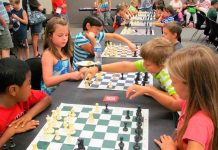Путешествуем по миру
Составитель: Лопатова Юлия Михайловна,
учитель английского языка,
МБОУ СОШ № 9.
lopatova.yuliya@mail.ru
НСО,г.Куйбышев
2014
Путешествуем по миру
2 класс
Форма проведения: урок.
Цель: познакомить с традициями народов мира.
Задачи:
-
учебная: активизировать навыки монологической и диалогической речи. Активизировать навыки орфографии.
-
развивающая: развивать речевые способности, психологические функции, связанные с речевой деятельностью (память, мышление, способность логически мыслить, умение анализировать).
-
воспитательная: воспитывать уважительное отношение друг к другу, развивать умение слушать товарища.
Оборудование: интерактивная доска, картинки, учебник “Enjoy English-2” Биболетовой М З., краски.
Ход урока
1. Организационный момент.
Teacher: Let’s greet each other in English. Good morning!
Children: Good morning!
Teacher: А теперь ответьте, как дела? (Звучит музыка в стиле джаз) Hi! How are you?
Children: Hi! Fine! How are you?
Teacher: Fine, thank you! We are going to the International party today.
We’ll make new friends, learn something new and have fun! Let’s start.
2. Основная часть.
Фонетическая зарядка.
Teacher: Let’s warm up, my dear friends.
Звуки очень нам важны.
Звуки разные нужны.
Кто-то бегал и устал.
[u] – [u] – [gud] сказал. (Ребята повторяют хором за учителем).
Отдохнул и песню спел [е], [е, [е], [е], [е], [е]
О тебе и обо мне. (Дети повторяют звуки хором).
А теперь пора домой [d], [d], [d]
Дорoгой той. (Дети повторяют).
Teacher: Very good, children. You are doing fine all the time!
Речевая разминка .
Teacher: Can you speak Indian?
Children: No, not at all!
Teacher: Can you speak Chinese?
Children: No, not at all!
Teacher: Can you speak English?
Children: Yes, we can!
Teacher: OK, everybody will understand us if we speak English. Now, you meet guests from all over the world at the International Airport. (Дети ходят по классу, задают вопросы и отвечают на них. Формируются произвольные группы и пары).
Примерные вопросы и ответы.
What is your name? (My name is Ann)
Where are you from? (I’m from England)
Do you travel with friends? (Yes, I do)
Have you ever been to Russia? (No, I haven’t)
Teacher: You are getting well! Nice to meet you!
Children: Nice to meet you!
Teacher: I see we are ready to go to the International carnival! Where do we go first? (На интерактивной доске появляется флаг Индии, звучит индийская музыка).
Teacher: Can you speak Indian?
Children: Not at all.
Teacher: Can you speak English?
Children: Yes, we can.
Teacher: Let’s speak English! (На доске появляются картинки, дети озвучивают их)
P1 – coffee,
P2 – tea,
P3 – elephant,
P4 – disco,
P5 – flower,
P6 – dance.
Teacher: In India there is a Holifestival. It means that good wins evil. In this day we should forgive debts, make up quarrels, with each other good luck. All our dreams will come true if we paint our faces.
1 – red,
2 – blue,
3 – brown,
4 – green,
5 – yellow.
(Каждая пара учеников получает нарисованное лицо, где есть рисунок с зашифрованными цветами. Дети расшифровывают цвет и красят рисунок).
Разукрашенные лица крепятся у доски.
Teacher: Where are we going now? (На доске появляется флаг Китая).
Children: To China!
Teacher: Right you are! Can you speak Chinese?
Children: no, not at all!
Teacher: Can you speak English?
Children: Yes, we can.
Teacher: Let’s speak English. In China people celebrate a New Year day in February. Let’s say: Happy New Year.
Children: Happy New Year!
Teacher: People believe that there lived a beast. He ate people. We scare him away to be Happy in a New Year.
Физкультминутка.
Песня: (Дети поют песню и выполняют движения).
If you are happy and you know clap your hands.
If you are happy and you know clap your hands.
If you are happy and you know and you really want to show.
If you are happy and you know clap your hands.
If you are happy and you know stamp your feet.
If you are happy and you know stamp your feet.
If you are happy and you know and you really want to show.
If you are happy and you know stamp your feet.
If you are happy and you know click your fingers.
If you are happy and you know click your fingers.
If you are happy and you know and you really want to show.
If you are happy and you know click your fingers.
(Можно использовать в песне : touch you knees, turn around, say OK).
Teacher: There is a tradition to eat dumplings on this day. Let’s make them. (На доске написаны предложения. Дети, работая в группах, должны указать последовательность приготовления пельменей. Через минуту — проверка на интерактивной доске).
Например:
P1 – Take some flour, eggs, salt and water.
P2 – Mix everything and make some dough.
P3 – Roll and cut the dough in to slices.
P4 – Prepare different fillings.
P5 – Make dumplings, boil them and eat.
Teacher: Now wish each other:
Good luck!
Be Happy! (На доске появляется флаг Великобритании).
Teacher: Here we are at last. In Great Britain. (На доске дети наблюдают смену листов календаря. Остановка. Перед всеми появляется название “St. Valentine’s Day”).
Teacher: Can you speak English?
Children: Yes.
Teacher: Let’s go to Britain. But first we should book the tickets. Work in pairs and prepare the dialogue “At the ticket office”. (Класс делится на две группы. Дети тянут жребий – красные и синие жетоны. Дети становятся в две линии друг напротив друга. “Синие” – продают билеты, “красные” – покупают)
Примерный диалог :
— Hello. Can I help you?
— Hello. Two tickets to Dublin.
— 30$, please.
— Here you are.
— Your tickets, please.
— Thank you.
— You are welcome.
Teacher: What attributes of St. Valentine’s Day do you know? (Дети называют слова ).
P1 – love,
P2 – arrow,
P3 – flower,
P4 – rose, Cupid,
P5 – smile,
P6 – chocolate, lace,
P7 – valentine.
Teacher: Of course, valentines. I’ll give you some valentines. You are to write your wishes to each other.
(Дети оформляют валентинки ).
Teacher: Exchange, please, your valentines. Be always together with people you love. If you want you can understand any person from any country. Will you stand up and recite our poem.
I met a little girl.
Who came from another land.
I couldn’t speak her language,
But I took her by her hand.
We dance together,
Had such fun!
Dancing is a language,
You can speak with anyone.
Teacher: Thank you for your work. Today you have known some interesting traditions. I’m sure you can speak English, so you can travel everywhere and make new friends. The lesson is over. Have a good time. Good bye.
3. Домашнее задание:
Name the countries where people wear their traditional clothes in everyday life, make the drawings.





